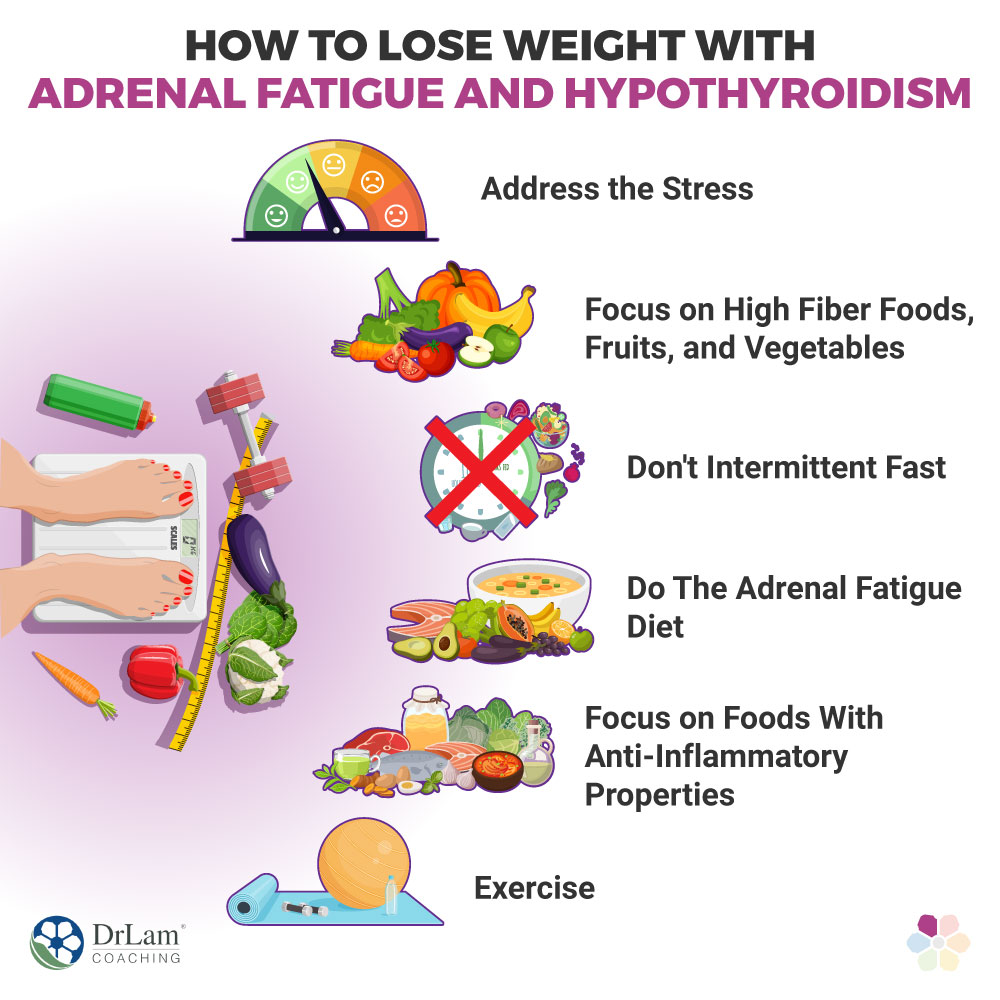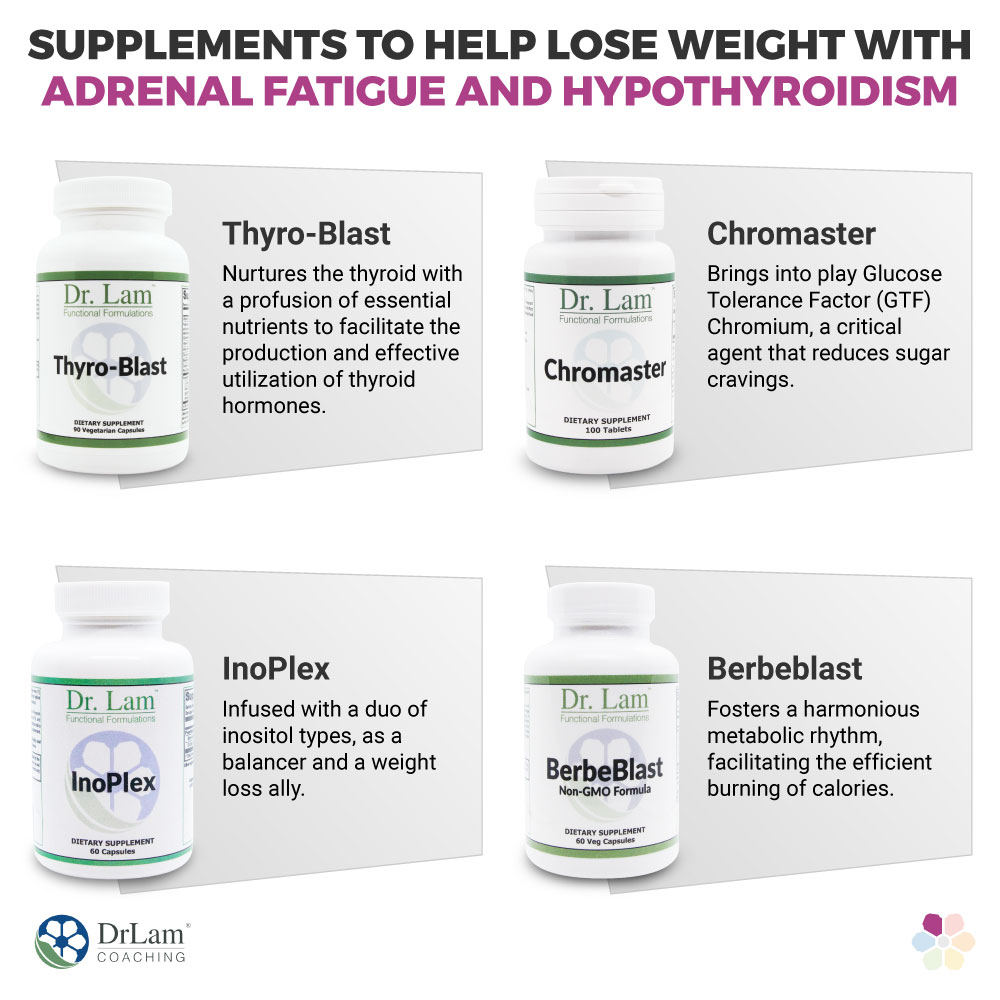 People gain weight for many reasons. A sedentary lifestyle, overeating, and following an unhealthy diet all play a part. However, some people, no matter how hard they try, tend to pick up weight rather than lose it. They may cut out sugar and carbohydrates, count calories, or meticulously follow a healthy diet plan, but all to no avail. Many of these people suffer from hypothyroidism and/or adrenal fatigue without knowing it. Either of these conditions alone could contribute to weight gain. Together, they could lead to an upward spiral of weight gain. But with the right steps, you can lose weight with adrenal fatigue and hypothyroid.
People gain weight for many reasons. A sedentary lifestyle, overeating, and following an unhealthy diet all play a part. However, some people, no matter how hard they try, tend to pick up weight rather than lose it. They may cut out sugar and carbohydrates, count calories, or meticulously follow a healthy diet plan, but all to no avail. Many of these people suffer from hypothyroidism and/or adrenal fatigue without knowing it. Either of these conditions alone could contribute to weight gain. Together, they could lead to an upward spiral of weight gain. But with the right steps, you can lose weight with adrenal fatigue and hypothyroid.
But first, need to understand hypothyroidism and adrenal fatigue, and how these two conditions create a feed-back loop that increases your risk of weight gain.
Weight gain is one of the many symptoms associated with adrenal fatigue. And the reason for this lies in your hormones.
Adrenal fatigue results from an imbalance in your levels of cortisol. Also known as Adrenal Fatigue Syndrome (AFS), it is the non-Addison's form of adrenal dysfunction, where the body's stress response cannot keep up with life's chronic stressors. It can involve high or low levels of cortisol. Either can interfere with your other hormone levels and cause several health issues symptomatic of adrenal fatigue.
The main cause of high or low cortisol levels is stress. Whether resulting from internal or external factors, increased stress initially causes an increase in cortisol production in your adrenal glands. The increase in cortisol is spontaneous and forms part of your body’s NeuroEndoMetabolic (NEM) stress response. It also activates the flight or fight response. Under normal conditions, your cortisol production returns to normal once the stressful period passes.
However, it is a different story when stress persists and adrenal fatigue sets in. As your body progresses through the various stages of adrenal fatigue, your adrenal glands initially keep up with the high cortisol demand, but at a certain point, they become fatigued and have difficulty producing the required amount of cortisol your body needs to combat the stressor.
With regards to weight gain, high cortisol levels tend to reduce your body’s ability to correctly respond to insulin while inhibiting its production.1 Another problem is that higher cortisol levels and the resulting hormone imbalance cause the release of glucose in your cells. When this happens, your brain perceives hunger. As a result, you tend to want to eat.
What we now have is the beginning of a cortisol-fat-stress cycle.
In essence, stress causes an increase in cortisol production. Your cells then release glucose. This glucose release leaves your cells demanding a glucose replenishment. This leaves you feeling hungry. Eating more causes a fat buildup. And here is the kicker! Fat causes stress! The cycle then repeats itself.
Hypothyroidism is a condition that results in weight gain due to a decrease in the thyroid gland’s ability to produce enough thyroid hormone. This inability is because of issues with your endocrine system. Essentially, this hormone imbalance lowers your metabolic rate. This not only causes weight gain but influences various body functions and systems as well. Your adrenal glands form part of your endocrine system.
The main job of the thyroid gland is to regulate metabolism.
The symptoms of hypothyroidism and adrenal fatigue are very similar. Examples of these include weight gain, fatigue, hair loss issues, depression, brain fog, and irregular periods.
 Many people with hypothyroidism also suffer from adrenal fatigue. The converse also applies. This is because adrenal fatigue and the subsequent increase in cortisol production can play a direct role in decreasing the thyroid gland’s ability to produce enough thyroid hormone. Your thyroid and adrenal glands need to work together in harmony. This is because together, they supply essential hormones your body needs and deliver them throughout your body. When these organs no longer work as they should, you may develop several seemingly unrelated symptoms.
Many people with hypothyroidism also suffer from adrenal fatigue. The converse also applies. This is because adrenal fatigue and the subsequent increase in cortisol production can play a direct role in decreasing the thyroid gland’s ability to produce enough thyroid hormone. Your thyroid and adrenal glands need to work together in harmony. This is because together, they supply essential hormones your body needs and deliver them throughout your body. When these organs no longer work as they should, you may develop several seemingly unrelated symptoms.
This close connection could be why many people who suffer from adrenal insufficiency are wrongly diagnosed as suffering from hypothyroidism. 2
Healthy weight loss with hypothyroid and adrenal fatigue is indeed possible. First, however, you may need to address your stress hormone levels and any other related health challenges you may face.
Another thing to keep in mind when dealing with weight loss for adrenal fatigue and hypothyroid is that you may need to manage blood sugar spikes. As mentioned, heightened cortisol levels cause a release of glucose. This impacts your blood sugar levels on the one hand and the glucose levels in your cells on the other and makes you feel hungry. This can cause many people with adrenal fatigue and hypothyroid to gain weight or even develop diabetes.
In addition, calorie counting may not help much in this case. While we should be mindful not only of what we eat but of how much we eat, sharply reducing calories from food may not necessarily help you lose weight with adrenal fatigue and hypothyroid. Because your body is already low on energy and stressed, your brain may tell your body it is going into a time of starvation. When this happens, your body will desperately try to hold on to any calories entering your body and store them as fat. This is why it is important to reduce calories carefully when trying to lose weight with adrenal and thyroid problems. We'll look at how to do this in the following section.

First off, please understand there is no quick fix in a weight loss journey. Healthily losing weight is a slow, steady process. Yet it can be done. It does, however, take time, hard work, and perseverance. But at the end of the day, you will have a healthier body and not be as susceptible to health issues as you are now.
Stress is the root cause of adrenal fatigue and can contribute to hypothyroidism. Both conditions contribute to weight gain. So, to lose weight, you need to manage your stressors.
 Focusing on these foods could help detox your body and give your metabolism a boost. Many of these healthy, low-calorie foods do not put an inordinate strain on your body’s digestive processes.
Focusing on these foods could help detox your body and give your metabolism a boost. Many of these healthy, low-calorie foods do not put an inordinate strain on your body’s digestive processes.
These foods have several benefits3. High-fiber foods, besides helping with metabolic issues can also:
Besides natural sources of fiber, you can also look at taking fiber supplements. Do make sure, though, to drink plenty of water with them and talk to your healthcare provider first.
Intermittent fasting, while a popular and effective weight loss strategy for some, may not be the most suitable approach for individuals grappling with late-stage adrenal fatigue. The practice of intermittent fasting typically involves extended periods of not eating, which can lead to significant fluctuations in blood sugar levels. For those with adrenal fatigue, maintaining stable blood sugar levels is crucial to prevent undue stress on the adrenal glands. Extended periods of fasting may precipitate spikes and subsequent crashes in blood sugar, exacerbating the symptoms of adrenal fatigue and potentially hindering the healing process. Instead, adopting a dietary strategy that emphasizes smaller, more frequent meals could be more beneficial. Regular, balanced meals can help in maintaining steady blood sugar levels, preventing abrupt fluctuations and supporting adrenal recovery, thereby creating a more supportive environment for weight loss in individuals with adrenal fatigue and hypothyroidism.
The adrenal fatigue diet is a potentially helpful diet that focuses on foods that promote adrenal health. It focuses on healthy vegetables and protein sources that have a calming effect and that contain the vitamins and minerals your body needs to heal itself. It recommends eating small, regular meals starting soon after waking to balance blood sugar, and focuses primarily on fruits, vegetables, lean protein sources like bone broth, and healthy fats. Depending on your stage of adrenal fatigue, it may be better to start with a gentle diet like this to help heal your body and balance your energy needs before attempting to lose weight.
Inflammation is one of the key causes and symptoms of adrenal fatigue. We refer to inflammation of the thyroid gland as thyroiditis. This condition has an impact on the thyroid gland’s ability to release thyroid hormones. People with thyroiditis may see changes in thyroid hormone levels in the blood. 4
Foods to eliminate include:
Foods that fight inflammation, however, include the following:
Exercise has many helpful benefits for those trying to lose weight with adrenal fatigue and hypothyroid. These benefits include the following:
 Increased energy levels
Increased energy levelsBut before you start pounding the pavements or doing heavy lifting, take note that over-exercising may not benefit those with adrenal fatigue. It could add to your stress levels, especially in a body already struggling to cope with stressors.
Instead, opt for low-impact cardio exercise when starting. It is best to start slow and increase your intensity as your body heals and your fitness levels increase. A brisk walk, light weight training, Pilates, yoga, and tai chi are good examples of this type of exercise.
Please talk to a healthcare practitioner before embarking on any form of exercise if you suffer from adrenal fatigue. The type and intensity of exercise you are ready for depends on your stage of adrenal fatigue.

Harnessing the gentle, yet potent qualities of a range of meticulously chosen ingredients, Dr. Lam's Thyro-Blast, Chromaster, InoPlex, and Berbeblast function synergistically to optimize thyroid and adrenal gland health, thereby fostering a conducive environment for weight loss.
Thyro-Blast nurtures the thyroid with a profusion of essential nutrients such as iodine, zinc, selenium, and a spectrum of B vitamins, facilitating the production and effective utilization of thyroid hormones. This is complemented by herbs like ashwagandha and guggul, which not only amplify thyroid functionality but also augment the body’s adaptogenic resilience to stress.
Chromaster brings into play Glucose Tolerance Factor (GTF) Chromium, a critical agent that reduces sugar cravings, and orchestrates a balanced interplay of proteins, fats, and carbohydrates.
InoPlex, infused with myo and chiro-inositol, emerges as a hormonal balancer and a weight loss ally. It brings stability and equilibrium to the body’s glucose landscapes.
Berbeblast, a powerful concoction of berberine, bitter melon, and banaba leaf, fosters a harmonious metabolic rhythm, facilitating the efficient burning of calories. This triumvirate of supplements collectively orchestrates a symphony of metabolic refinement, encouraging the shedding of excess weight, and nurturing the thyroid and adrenal glands to flourish in a state of balanced vitality. Their integrated approach offers a multifaceted pathway to weight loss, marrying scientific innovation with nature’s wisdom for enhanced metabolic well-being.
Do note that we strongly recommend you seek the advice of a healthcare provider before starting any type of supplement. Supplements may interact with certain medications or not prove suitable for use if you have underlying health issues.
Many people suffer from weight loss issues and do not know the reason why. In many cases, they struggle to lose weight with adrenal fatigue and hypothyroid issues. Yet it can be done. By making a few judicious lifestyle changes and consciously making healthier dietary choices, people with adrenal fatigue and/or hypothyroidism can lose weight and have a healthier body.
If you would like to know more about weight loss with adrenal fatigue and hypothyroid, the team at Dr. Lam Coaching can help. We offer a free, no-obligation phone consultation at +1 (626) 571-1234. We will privately address your concerns or questions. You can also contact us through the Ask The Doctor system by clicking here.
Schernthaner-Reiter, Marie Helene, et al. “The Interaction of Insulin and Pituitary Hormone Syndromes.” Frontiers in Endocrinology, vol. 12, Frontiers Media, 28 Apr. 2021, https://doi.org/10.3389/fendo.2021.626427
Upala, Sikarin, et al. “Primary Adrenal Insufficiency Misdiagnosed as Hypothyroidism in a Patient With Polyglandular Syndrome.” North American Journal of Medical Sciences, Medknow, 1 Jan. 2016, https://www.researchgate.net/publication/303553284_Primary_Adrenal_Insufficiency_Misdiagnosed_as_Hypothyroidism_in_a_Patient_with_Polyglandular_Syndrome
BSc, Kris Gunnars. “22 High Fiber Foods You Should Eat.” Healthline, 3 May 2023, healthline.com/nutrition/22-high-fiber-foods#benefits-of-fiber.
Website, Nhs. “Thyroiditis.” nhs.uk, 19 June 2023, nhs.uk/conditions/thyroiditis
Kwon, Da Hye, et al. “Protective Effect of Glutathione Against Oxidative Stress-induced Cytotoxicity in RAW 264.7 Macrophages Through Activating the Nuclear Factor Erythroid 2-Related Factor-2/Heme Oxygenase-1 Pathway.” Antioxidants, vol. 82, no. 4, Multidisciplinary Digital Publishing Institute, 1 Apr. 2019, https://doi.org/10.3390/antiox8040082
Goutzourelas, Nikolaos, et al. “GSH Levels Affect Weight Loss in Individuals With Metabolic Syndrome and Obesity Following Dietary Therapy.” Experimental and Therapeutic Medicine, Spandidos Publishing, 23 May 2018, https://doi.org/10.3892/etm.2018.6204
Yes, you can lose weight with adrenal fatigue and hypothyroid. It is not impossible. Making certain lifestyle choices can help support both thyroid and adrenal health while supporting your weight loss journey. Eating high fiber, non-inflammatory foods can help, as can exercise and the adrenal fatigue diet.
